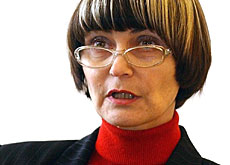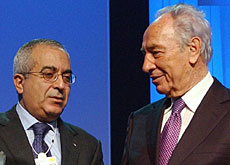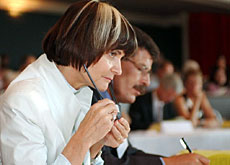Foreign minister begins key Middle East visit

Swiss Foreign Minister Micheline Calmy-Rey has embarked on a visit to the Middle East – just days ahead of a top-level Israeli-Palestinian meeting.
In an interview with swissinfo, Calmy-Rey said a major goal of the visit was to talk to Israelis and Palestinians about issues including the Israeli pullout from Gaza.
The visit is scheduled to include meetings with the new Palestinian president, Mahmoud Abbas, and Israeli deputy prime minister Shimon Peres, and will comprise three days in Israel and three in the Palestinian territories.
It comes against the background of a planned summit between Abbas and Israeli Prime Minister Ariel Sharon in Egypt on Tuesday – the first such meeting in at least four years.
swissinfo: Your trip comes at a time when the Middle East peace process seems to be getting back on track.
Micheline Calmy-Rey: Following the Palestinian elections, both sides are making efforts to stem the violence. The latest developments – the announcement of the Abbas-Sharon summit, Sharon’s declarations regarding the conditions necessary for implementing the Road Map, the Palestinian Authority’s moves to reinforce security and the visit to the region by US Secretary of State Condoleezza Rice – are encouraging.
In Davos, at last week’s World Economic Forum meeting, the two sides spoke openly and frankly. Nonetheless, one must remain prudent – an authentic peace process will only restart if all the main protagonists really commit themselves.
swissinfo: The Geneva Initiative was also discussed in Davos. What are its main achievements?
M.C-R.: We continue to support the Geneva Initiative, which is rooted in the larger framework of our commitment to the Middle East peace process. There is no doubt that [this initiative] has significantly contributed to re-dynamising the debate – both local and international – about the need for a comprehensive negotiated peace agreement based on clear parameters.
It is also clear that launching the Geneva Initiative pushed Israel to react by announcing its willingness to withdraw from Gaza and four West Bank settlements. The new Palestinian president has recently met the Israeli initiators of this proposal.
swissinfo: How do you see Switzerland’s role in the Middle East peace process generally?
M.C-R.: Switzerland concentrates particularly on the living conditions of the civilian population (what we call human security). All our actions in the [region] should be seen in this light: the Geneva Initiative, calls to respect international human rights law and the humanitarian aid that Switzerland has been providing for several years.
In the past four years, the situation of the civilian population has worsened. For this to change there must be an end to violence; then it will be necessary to take concrete measures to ensure civilians’ access to sanitary and social services. It will also be necessary to promote children’s education and to create jobs. These issues will be particularly important in the context of the Gaza withdrawal.
swissinfo: What is the Swiss position on the right of return of Palestinian refugees, and how does this fit with the provisions of the Geneva Initiative?
M.C-R.: The refugee question should not be considered in isolation; it must be dealt with in the context of a negotiated, comprehensive and equitable solution, which integrates all dimensions of the conflict and respects the essential interests of all parties in the framework of law and of the relevant UN Security Council resolutions. The Geneva Initiative represents one possible solution that would meet these requirements.
swissinfo: What are the main obstacles to such a settlement from the Swiss perspective?
M.C-R.: The problem of what happens to Palestinian refugees is highly emotional, because it evokes a decisive and extremely controversial episode – from the historical point of view in particular – resulting from what Israel calls the “war of independence” and the Palestinians term “Nakba”, or “catastrophe”.
For both sides, the refugee problem is existential in nature, from the point of view of their respective national projects. Thus, one can say that it will probably not be possible to solve the refugee question in a lasting way other than in the context of a global solution to the Arab-Israeli conflict.
swissinfo: What steps can be taken by both sides to successfully achieve disengagement in the Gaza Strip?
M.C-R.: The question of the economic viability of the Gaza Strip after the withdrawal, which implies the lifting of barriers to the free movement of goods and services between Gaza and the West Bank, between Gaza and Egypt, between Gaza and Israel and between Gaza and the rest of the world, is obviously crucial.
If this economic and commercial viability of Gaza is not fully addressed in a coordinated fashion by all concerned parties in the context of the implementation of the withdrawal plan, a lasting stabilisation of the situation in Gaza – particularly in security terms – would seem to be wishful thinking.
swissinfo–interview: Chris Lewis
The Abbas-Sharon summit will be the first such meeting for four years.
Top-level talks between the two sides broke down in 2001, with the Israelis refusing to deal with then Palestinian leader Arafat.
US Secretary of State Condoleezza Rice is due to meet both Sharon and Abbas next week during her trip to the region.
Calmy-Rey’s visit to the Middle East comes ahead of a crucial summit between Palestinian leader Abbas and Israeli prime minister Sharon.
The Swiss foreign minister is due to meet both Abbas and Israeli deputy prime minister Peres.
She will also discuss issues of “human security” and the future of the Swiss-backed Geneva Initiative.

In compliance with the JTI standards
More: SWI swissinfo.ch certified by the Journalism Trust Initiative











You can find an overview of ongoing debates with our journalists here . Please join us!
If you want to start a conversation about a topic raised in this article or want to report factual errors, email us at english@swissinfo.ch.